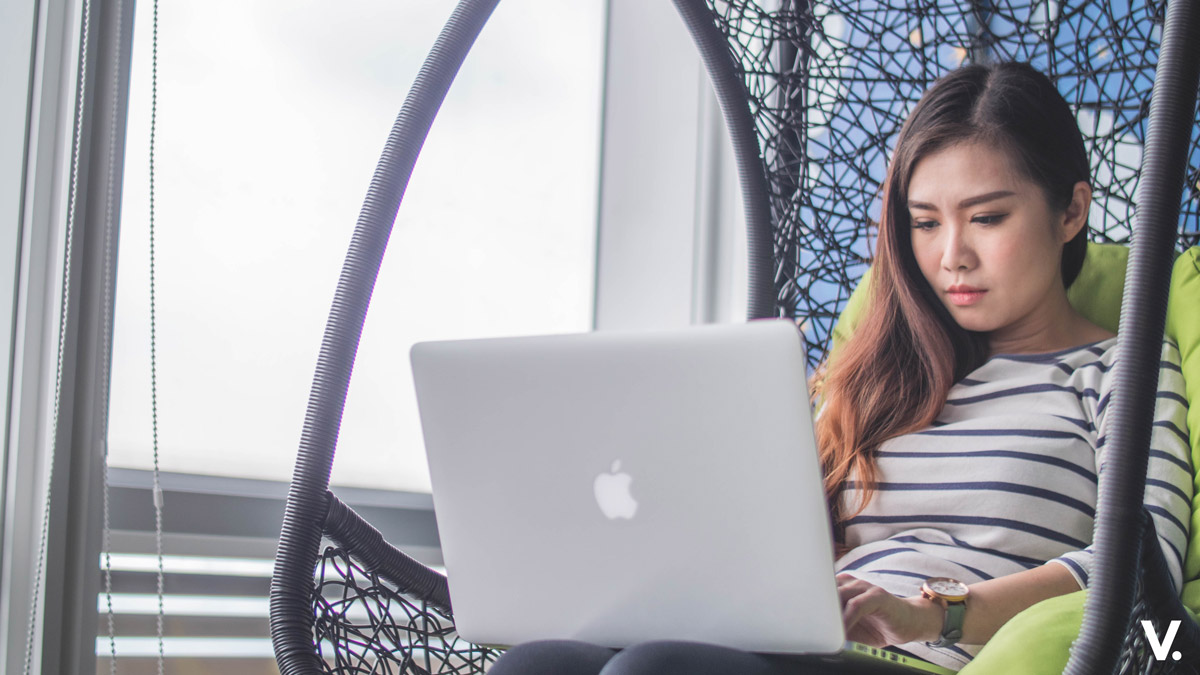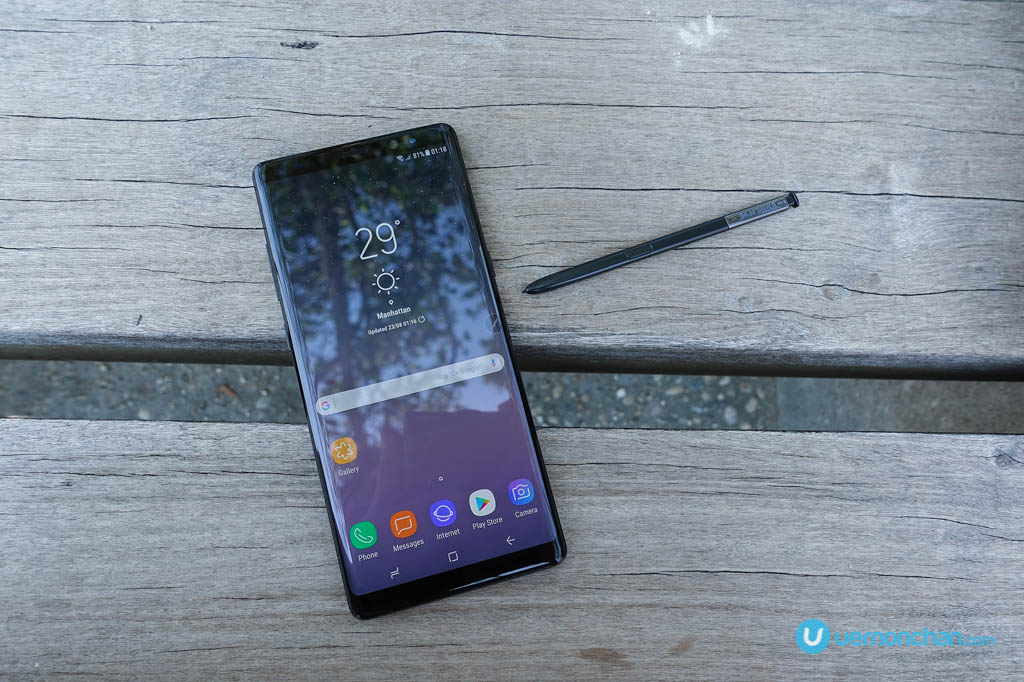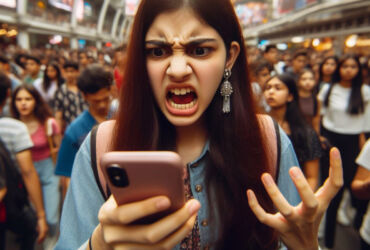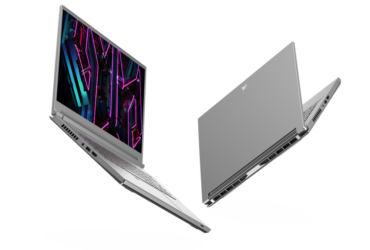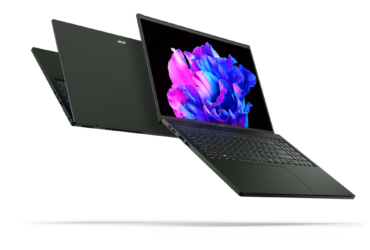The internet, as we know it, is a vast, rich digital platform of knowledge, entertainment, interaction and more. For all its virtues, there’s also a darker, damaging side. In conjunction with Safer Internet Day (11 Feb), Microsoft released findings of the 2020 Digital Civility Index (DCI) report, which among other things, examined the extent of negative behaviours and online interactions and their impact; and to serve as an evidentiary base for a global drive toward “digital civility.”
Global digital civility: How it stands
What’s interesting is that Malaysia came out fourth out of the 25 countries surveyed in the report, despite a marginal 1 percent increase in the DCI score as compared to last year. The UK (52 percent) was found to be the most civil, followed by the Netherlands (56 percent) and Germany (58 percent). The USA, another surprise, was right behind Malaysia, at the fifth spot (60 percent).

South Africa (83 percent), Peru (81 percent), Colombia (80 percent), Russia (79 percent), and Vietnam (78 percent) were found to be the most uncivil.
The 2019 report is based on the views of 12,520 adults and teens across 25 countries.
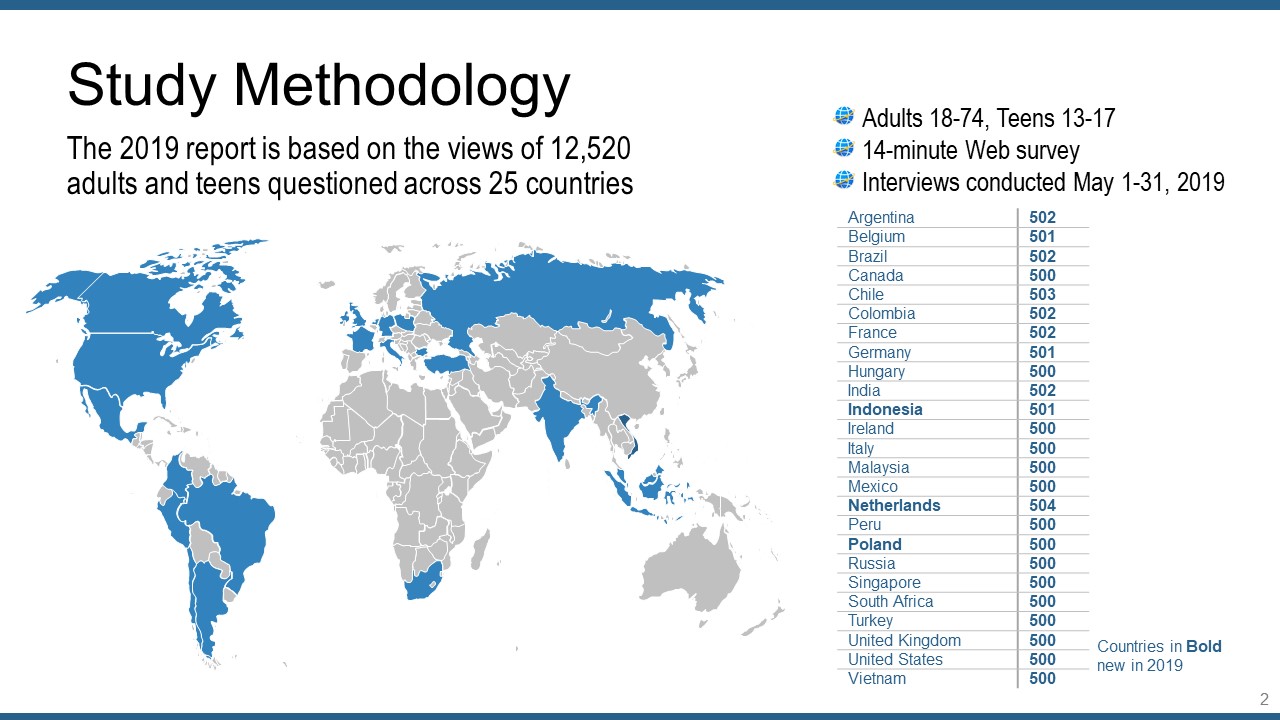
Religion and politics get Malaysians riled up
In Malaysia specifically, the survey questioned 500 teens and adults, to examine the extent of negative behaviours and online interactions, various internet risks they face and the varying levels of pain that it can cause to online users.
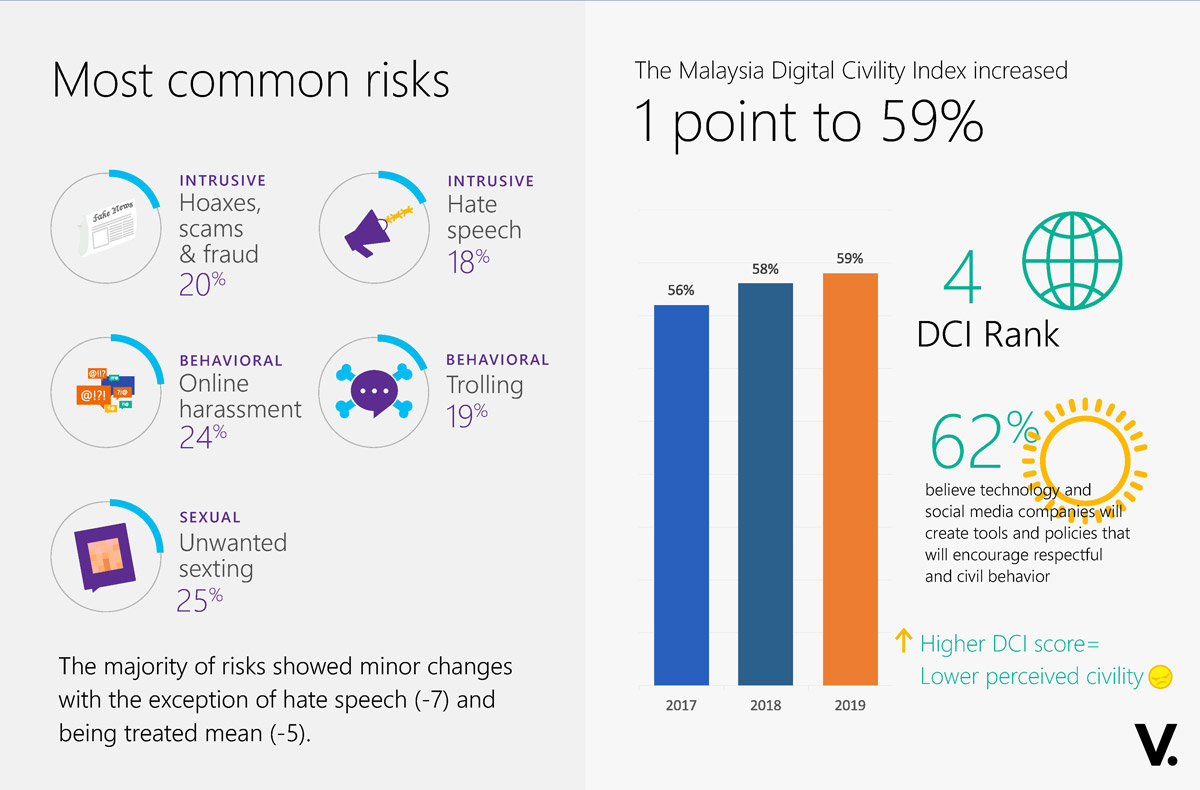
The most common risks are categorised as either Intrusive, Behavioural or Sexual, with Hoaxes, Scams and Fraud making up 20 percent; Hate speech (18 percent); Online Harassment (24 percent); Trolling (19 percent); and Unwanted Sexting (25 percent). The survey also revealed the majority of risks showed minor changes with the exception of Hate Speech (-7 percent) and Being Treated Mean (-5 percent).
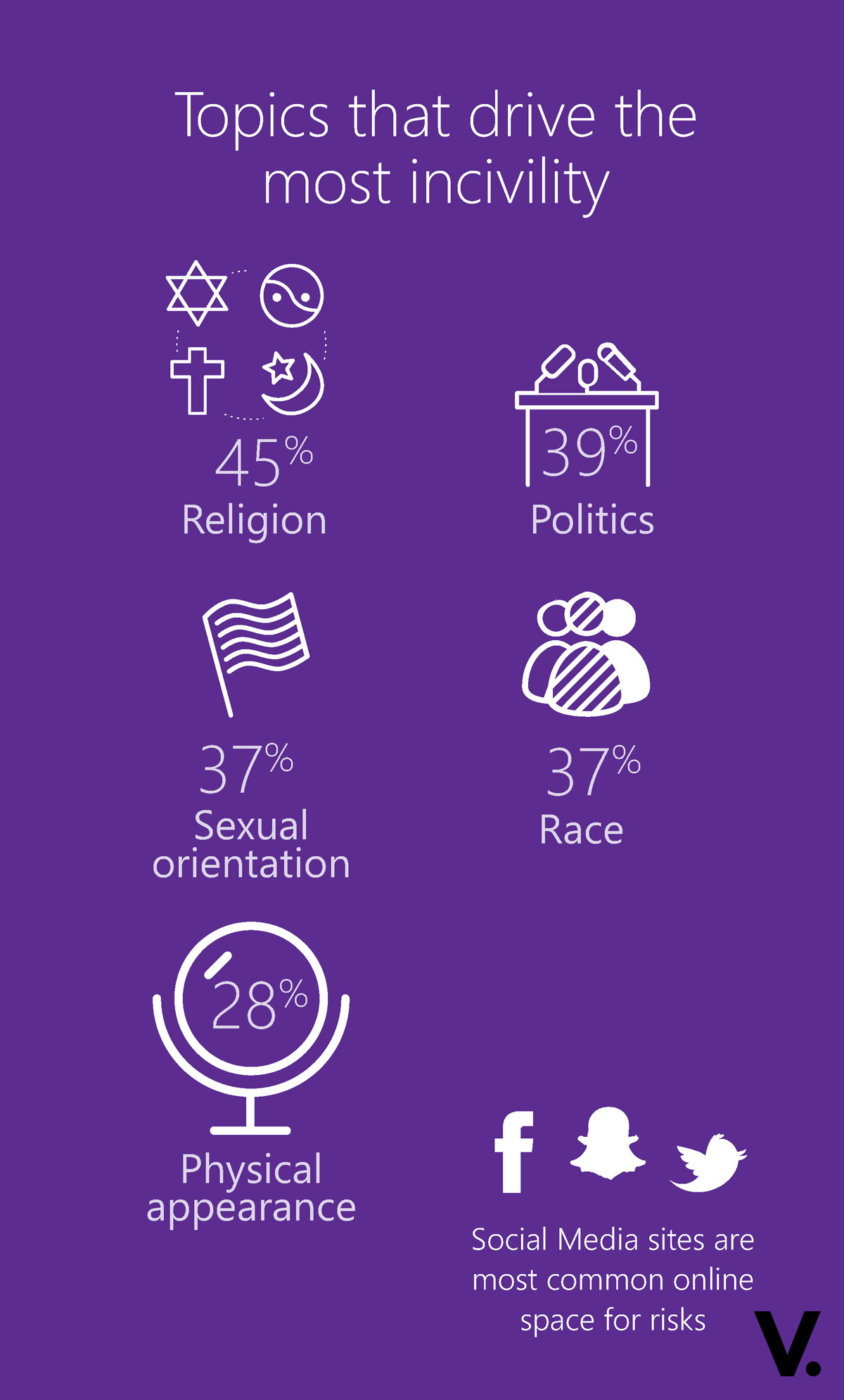
Globally, the top risks were unwanted contact; hoaxes, frauds and scams; unwanted texting; and trolling.
Topics that drive the most incivility amongst Malaysians include Religion (45 percent); Politics (39 percent); Sexual Orientation (37 percent); Race (37 percent); and Physical Appearance (28 percent). Social media platforms were found to be the most common online space for risks.
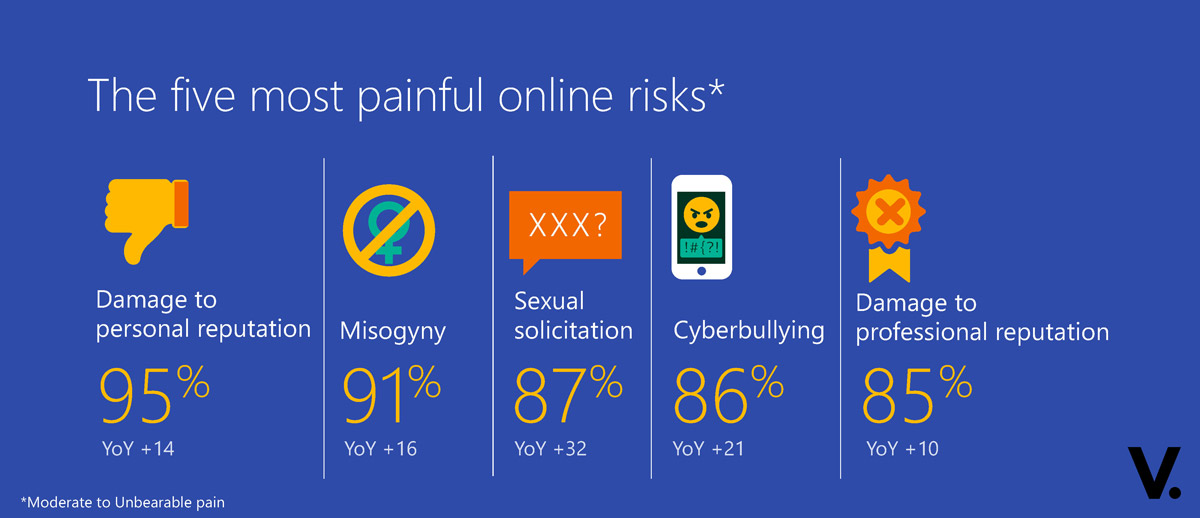
These risks, in turn, can potentially cause real-world harm such as pain and anxiety. Among the most damaging risks for Malaysian netizens include: Damage to Personal Reputation (95 percent); Misogny (91 percent); Sexual Solicitation (87 percent); Cyberbullying (86 percent); and Damage to Professional Reputation (85 percent).
The report reveals that Millennials DCI (66 percent) are the most at-risk adult group, followed by Boomers DCI (62 percent); Gen Z DCI (55 percent); and Gen X DCI (52 percent).
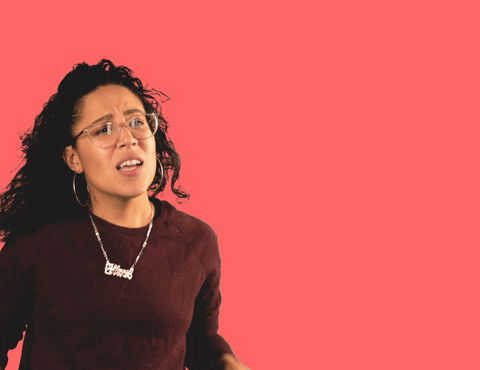
The rising tide of incivility
Are people becoming desensitised to uncivil behaviour? Are they becoming resigned to the current hostile environment as “the new normal”?
The trend is indeed worrying. The DCI increased by 4 points to 70 percent in 2019, where about half of the 25-country DCI scores rose significantly. Fifteen countries registered their worst DCI scores since the study was established in 2016.
Many countries in the study have seen a rise in populist movements or politicians who employ incendiary rhetoric. Nearly four in ten adults said politics was the centre of online incivility.
Real-world harm from online risks accelerated in 2019, and the study found a global decline in people taking positive actions including elements of the Digital Civility Challenge.

The Digital Civility Challenge rides on four ideals:
- Live the golden rule: I will act with empathy, compassion and kindness in every interaction, and treat everyone I connect with online with dignity and respect.
- Respect differences: I will appreciate cultural differences and honour diverse perspectives. When I disagree, I will engage thoughtfully and avoid name-calling and personal attacks.
- Pause before replying: I will pause and think before responding to things I disagree with. I will not post or send anything that could hurt someone else, damage someone’s reputation, or threaten my safety or the safety of others.
- Stand up for myself and others: I will tell someone if I feel unsafe, offer support to those who are targets of online abuse or cruelty, report activity that threatens anyone’s safety, and preserve evidence of inappropriate or unsafe behaviour.
More than half of the respondents hold a pessimistic view of the current state of digital civility and did not foresee major improvements in the coming year. That said, they were more optimistic that things will change for the better in the decade ahead.
Half of the respondents believe that technology can help improve digital civility, with the hope that social media companies can create tools and policies that promote respectful and civil behaviour. They also have an expectation that technology will provide them with better tools for them to protect their personal information and privacy in the future.
On the positive side of things, respondents hoped that the online world in the 2020s would be characterised by respect and safety, as well as freedom and civility.
Download and read the 2020 Global Report
Microsoft has been an active participant in Safer Internet Day each year since it started in 2004, and for the past several years, it has also served as the launch date for our Digital Civility Index (DCI). You may want to read this byline article by Antony Cook, Regional Vice President and Chief Legal Counsel, Asia, Microsoft, on how we can be safer online by being wary of current trends and threats, and how to protect ourselves and people around us against emerging cyberthreats.
TL;DR version

Header photo by Mimi Thian on Unsplash


